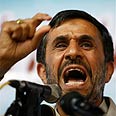
Conservative rival gains ground in Iran
Reformist camp hopes hard-liner Mohsen Rezaei's dark-horse campaign will divide conservative vote by chipping away at bedrock of Ahmadinejad's support
Some of the biggest election day tests for Iranian President Mahmoud Ahmadinejad may not just come from his pro-reform challengers, but from within the conservative ranks that pushed him to victory four years ago.
His lone hard-line rival - veteran regime insider Mohsen Rezaei - has been quietly, but steadily, chipping away at the bedrock of Ahmadinejad's support: working-class families, war veterans and others whose identity is deeply rooted in the Islamic Revolution.
Rezaei, a former commander of the powerful Revolutionary Guards, is still considered a long-shot in the four-candidate race that includes Ahmadinejad and two reform-leaning challengers.
But his dark horse campaign is far from insignificant and could pose some serious hurdles for Ahmadinejad on June 12.
For conservatives, he offers a clear protest vote for those complaining Ahmadinejad has spent too much time snarling at the West and not enough time on Iran's slumping economy. Reformers - including backers of front-running challenger Mir Hossein Mousavi - are hoping Rezaei could split the conservative vote and leave Ahmadinejad vulnerable.
There are even hints of a possible political alliance between Rezaei and reformists if Ahmadinejad is ousted, but Rezaei's presence in any government could further sour relations with the West and efforts to move ahead with possible talks with Washington.
He is among six people - five Iranians and one Lebanese - wanted by Interpol in connection with a 1994 bombing of a Jewish center in Argentina that killed 85 people. Iran has rejected the warrants as politically motivated.
The Interpol case is now barely mentioned in Iran and appears to have no influence on Rezaei's campaign as it gains steam.
"There will be some natural drift from Ahmadinejad to Rezaei," said Amir Mohebian, a prominent political analyst in Tehran.
Firing up the crowd on nostalgia
It was evident in central Iran on Sunday. Rezaei held exactly the kind of hinterland rally that has become Ahmadinejad's trademark.
Rezaei fired up the crowd with praise and patriotic nostalgia - calling them the soul of the Islamic Revolution and recalling the struggles during the 1980-88 war with Iraq.
"The savior of Iran," his supporters chanted back in Fooladshahr, a small factory city designed in the shape of a crown by the Western-backed monarchy before its collapse in the 1979 revolution.
Rezaei's main draw may come from veterans of the Iraq war in the 1980s, which occupies a huge space in Iran's self-made narrative of the Islamic Revolution and its early struggles. Rezaei, 57, took command of the powerful Revolutionary Guards in 1981 when he was just 27 years old and held the post until the mid-1990s — giving him long and privileged access to the ruling theocracy that directly controls the Guards.
Rezaei now serves on the Expediency Council, which mediates in disputes between the ruling clerics and elected lawmakers.
Four years ago, the Guards and its vast volunteer force, known as the Basiji — with the potential to sway millions of votes — were solidly behind Ahmadinejad. It helped that Rezaei pulled out of the 2005 presidential race and threw his support Ahmadinejad's way.
It's not so clear this time.
Rezaei has stressed his wartime credentials and support of veterans at nearly every campaign stop, suggesting sizable support from within the Guards. Ahmadinejad, too, appears to have strong backing within the Guards, which allowed the president center stage last month to announce the test firing of an upgraded missile capable of hitting Israel and the rest of the Middle East.
'Economy at the precipice'
Political commentator Sharif Emam Jomeh believes Rezaei gives conservatives an option to turn against Ahmadinejad but remain loyal to their ideological leanings.
"It will allow voters to punish Ahmadinejad without betraying their beliefs," he said.
Rezaei bowed out of the race in 2005 to give Ahmadinejad a clearer path.
There's no sign of shrinking from a fight now. Rezaei has taken aim at nearly every Ahmadinejad policy with relentless attacks and sound bites worthy of a polished campaigner.
He warned that Ahmadinejad's handling of the economy - now burdened by double-digit inflation and unemployment - has brought the country's finances "to the precipice." Oddly, however, one of his senior advisers is Davood Danesh Jafari, who was Ahmadinejad's economy minister.
Rezaei also has offered a somewhat more moderate path than Ahmadinejad on possible talks with Washington and the international impasse over Iran's nuclear program.
He has suggested a step-by-step approach with Washington that could begin with partnerships in such areas as fighting drug trafficking from Afghanistan. On the nuclear standoff, he has proposed creating an international consortium to oversee uranium enrichment in Iran.
Iran says its nuclear program is purely for energy-producing reactors, but the United States and others worry it could lead to atomic weapons development.
Even Ahmadinejad's backers predict Rezaei will pull away votes.
The head of the Islamic Coalition Party, Mohammad Nabi Habibi, said Monday that some of the "core conservatives" will go for Rezaei next week.
But political analyst Saeed Lailaz believes Ahmadinejad is not in real danger from Rezaei.
"Conservatives will either vote for Ahmadinejad or will not vote for anybody else," he said.










